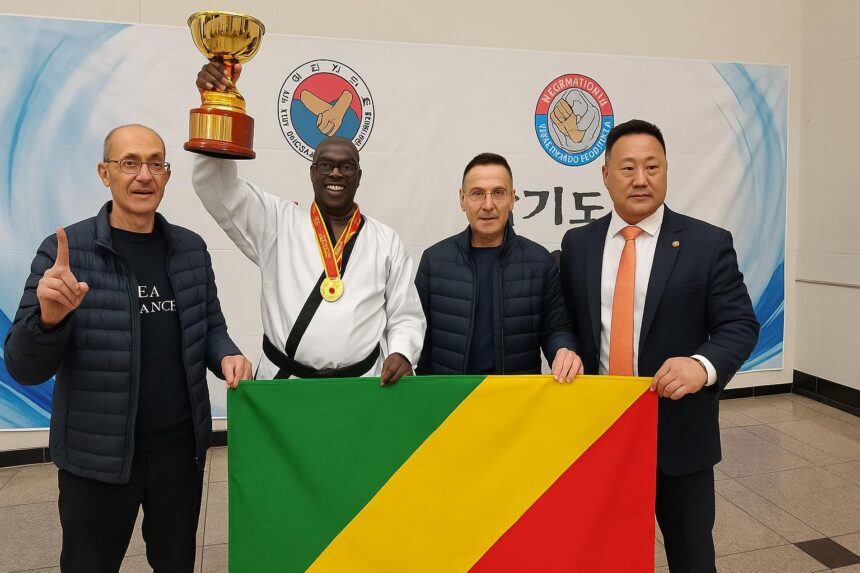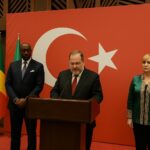Seoul triumph lifts the tricolour
On 26 October, the echo of a gong inside a packed gymnasium in Seoul signalled a moment of pride for Congo-Brazzaville. Master Edmond Narcisse Gandsié Dzia stepped onto the podium, gold medal around his neck, while the tricolour fluttered on the central mast.
The 39-year-old instructor from Brazzaville clinched first place in the senior-veteran over-83-kilogram division during the International Hapkido Open that closed a week-long seminar reserved for certified masters. Fifteen challengers from Asia, Europe and the Americas were outclassed by his measured kicks and precise locks.
Organisers, including the Korea Hapkido Federation, saluted his “technical creativity and excellent spirit.” The honour crowns a season already marked by his selection as representative of the Congolese Hapkido Federation, an affiliation officially recognised by the Ministry of Sports since 2021 (Korea Hapkido Federation communiqué).
Spectators captured photos, boosting Congo’s visibility across Korean media platforms and regional sport blogs throughout the global web.
The journey of Master Gandsié Dzia
Raised in Talangaï, the northern district of Brazzaville, Gandsié Dzia discovered martial arts by imitating film heroes before enrolling at age thirteen in a modest taekwondo club. He later switched to hapkido, seduced by its blend of circular motion and self-defence philosophy.
Over two decades, he progressed through coloured belts under Korean coach Kim Je-hoon, earned his 4th dan, and opened the Impact Hapkido Academy in Pointe-Noire. “My goal is to give youth confidence without violence,” he told local daily Les Dépêches de Brazzaville last month.
Inside the Masters Seminar and Open
The Seoul gathering combined technical workshops with live assessments. Masters revised joint-locking sequences at dawn, then sat theoretical exams on biomechanics. “Candidates needed at least 85 percent to qualify for competition,” detailed head examiner Lee Sung-ho in his final report (Korea Hapkido Federation).
During the open tournament, matches lasted two two-minute rounds. Points rewarded clean strikes, controlled throws and submission holds. Gandsié Dzia dominated early bouts by neutralising higher kicks, then surprised a Canadian finalist with a spinning wrist-lock that earned unanimous judges’ approval.
Beyond medals, the event aimed to spread hapkido’s global network. Congo’s participation was facilitated by a scholarship from the Korea International Cooperation Agency covering housing and equipment, highlighting the soft-power dimension of Korean martial arts diplomacy (KOICA programme outline).
Hapkido roots and local rise
Hapkido, literally “the way of coordinated energy,” was systematised in the 1950s by Choi Yong-sul. It borrows from Japanese daitō-ryū and traditional Korean sword schools, yet emphasises harmonic redirection over brute force, making it attractive to practitioners of varying body types.
In Congo, the discipline arrived in the early 2000s through expatriate oil workers in Pointe-Noire. Today, the federation lists 18 clubs and about 900 active students, half of them women, reflecting a broader appetite for self-defence classes across Central Africa (Congolese Hapkido Federation).
A plea for stronger state backing
Standing beside his South Korean hosts, Gandsié Dzia used the spotlight to ask for “sustained logistical and financial support so that national athletes can plan seasons, not miracles.” His remarks echo concerns raised by several federations after last year’s All-Africa Games qualifiers.
The Sports Ministry has increased its annual grant for minor federations by 12 percent in 2023, allocating funds for equipment and overseas travel, according to its latest budget breakdown. Officials say dossiers must now include performance indicators to ensure transparent use of public money.
Economists note that every international podium amplifies the country’s brand image, boosting tourism prospects and youth engagement. “Investing in sport is investing in social cohesion,” underlined researcher Odile Mabiala from Marien Ngouabi University during a recent round-table on creative industries.
Homecoming buzz and future goals
News of the gold travelled quickly on Congolese social networks. Short clips of the medal ceremony accumulated thousands of views on TikTok, while local radio hosts in Brazzaville replayed the national anthem recorded in Seoul, sparking an outpouring of congratulatory voice messages.
The federation plans a city-wide demonstration this weekend on the esplanade of Stade Alphonse-Massamba-Débat. Pupils will showcase falls, stick-defence drills and women-only self-protection scenarios, with Gandsié Dzia as guest of honour distributing certificates to new black belts.
Looking further ahead, the champion eyes the 2024 World Hapkido Championships in Busan. “Our ambition is collective,” he insisted. “Every coach who trains a child contributes to future medals.” His words resonated with parents already enquiring about holiday camps at dojos nationwide.





















